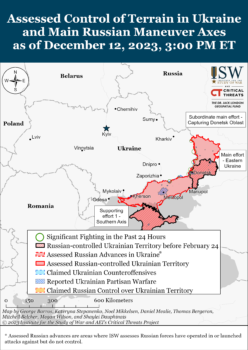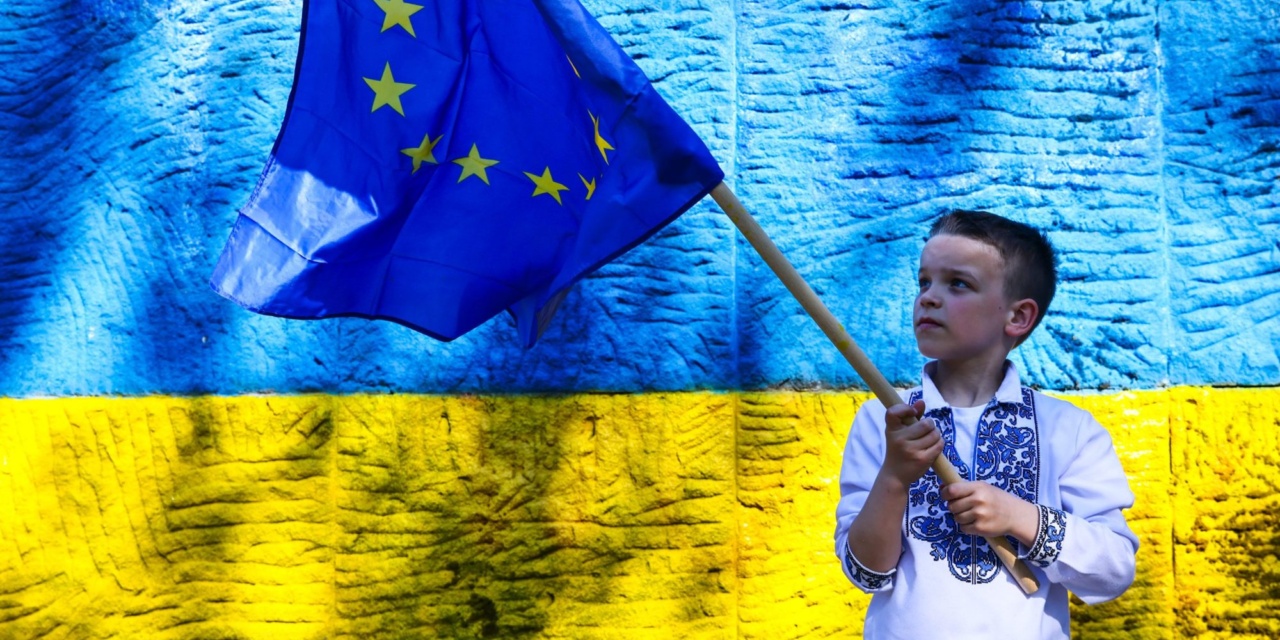Photo: Atlantic Council
Thursday’s Coverage: EU Pays Off Hungary to Ensure Aid to Kyiv

Map: Institute for the Study of War
UPDATE 1348 GMT:
Russia’s Central Bank has raised its key interest rate yet again, to 16%, amid spiralling inflation.
The rate has been raised five times since summer, more than doubling it.
The Central Bank said “annual inflation for 2023 is expected to be close to the upper bound of the 7.0% to 7.5% forecast range.”
However, the analysts of Russia’s Romir calculate that real consumer prices, based on a basket of everyday goods, rose by 47.9% between February 2022 — the start of Vladimir Putin’s invasion of Ukraine — and October 2023.
On Thursday, Vladimir Putin had to issue a rare “I’m Sorry” when questioned in his press conference about the soaring price of eggs.
Since January, the cost of chicken eggs has risen by 46.2%. In November alone, the rise was 15.1%, and this month the price is increasing by more than 4% each week.
Responding to a pensioner, Putin blamed others in the government for failing to increase imports in time.
UPDATE 1338 GMT:
A local politician has detonated grenades in a village council building in the Zakarpattia region in western Ukraine, killing one person and injuring at least 26.
Six of the wounded are in serious condition.
The politician, Serhiy Batrin, is a deputy serving on the commission on law and order. Doctors were reportedly trying to revive him after the attack.
After waiting at the door of the room where the council was meeting, Batrin took two grenades out of his pockets, interrupted an argument — “Can I?” — and dropped the explosives on the floor.
The State security service SBU has started an investigation.
❗️ Warning: Graphic Content ❗️
In Ukraine, in Transcarpathia, a deputy detonated grenades in the building of local village council
26 people were injured. Six are in serious condition.
The police qualify the grenade explosion in the building of the village council as a… pic.twitter.com/X3Sj37yJJ7
— NEXTA (@nexta_tv) December 15, 2023
UPDATE 1244 GMT:
One person has been killed and two injured in Russia’s latest attacks on the Kherson region in southern Ukraine.
Governor Oleksandr Prokudin said Russian forces carried out 102 attacks, firing 673 shells from mortars, artillery, Grad rocket launchers, tanks, aircraft, and drones.
UPDATE 1226 GMT:
The World Bank has allocated another $1.34 billion in financial assistance to Ukraine, helping to ensure the provision of critical public services.
The Bank cited “key sectors such as health care, education, payment of pensions, social assistance programs, and wages for employees providing core government services”.
The package consists of a $1.086 billion loan from the Bank; a $190 million grant from The Ukraine Relief, Recovery, Reconstruction and Reform Trust Fund; a $20 million grant from the Swiss Government; and a $50 million grant from the US Government.
Ukraine has received more than $22 billion through the World Bank during Russia’s invasion.
UPDATE 1214 GMT:
Hungarian Prime Minister Viktor Orbán has raised the price of his blackmail over the EU’s proposed €50 billion fund to support Ukraine.
Orbán told State radio that he wants all €31 billion of support funds held up by the EU because of his Government’s violations of rights and the rule of law.
The EU had agreed on Wednesday to release up to €10.2 billion, officially stating that Hungary had carried out judicial reforms — a declaration challenged by Hungarian civil society groups and some European Parliament members.
“This is a great opportunity for Hungary to make clear that it must get all of what it’s due,” Orbán said.
UPDATE 1111 GMT:
Arriving for the second day of the European Union summit in Brussels, Estonia Prime Minister Kaja Kallas spoke about the agreement to begin accession talks for Ukraine and Moldova.
Yesterday we made a historic decision.
As you know, I wasn’t very optimistic. But we managed to do the decision. And we are happy about this.
She said of Hungary’s veto of the €50 billion fund to support Ukraine against Russia’s invasion:
What of course we have to work with is the financial support.
What I can assure you that Ukraine will not be left without support. There was a strong will of 26 to provide this support, and there were different ways how we can do this.
So will work this out. Probably we’ll have another meeting, maybe in January, to reach agreement on this.
Lithuania President Gitanas Nausėda echoed, “Today we are celebrating. I am proud to be European, and it was necessary to send this political signal to our friends, in Ukraine especially.”
Hungarian Prime Minister Viktor Orbán, who walked out of the room rather than veto the decision of the other 26 EU leaders to begin accession talks, was in a much grumpier mood this morning.
He told State radio, “They are 26, and I’m alone.” But he declared,”There are about 75 occasions when the Hungarian government can stop this process. And [the EU] said that if during the negotiations there is something which hurts Hungary’s interests, I stop it.”
UPDATE 1051 GMT:
The Kremlin has reacted with bitterness over the European Union’s opening of accession talks with Ukraine and Moldova.
Spokesman Dmitry Peskov snapped that Kyiv’s accession is a “very remote prospect” and that its membership could destabilize the 27-nation bloc.
Negotiations to join the EU can last for years or decades. The EU has always had strict criteria for accession and it is obvious that at the moment neither Ukraine nor Moldova meets these criteria.
Peskov also fumed about a defense pact between Finland and the US, “This will certainly lead to tension. We can only regret this….When Finland is a Nato member and Nato’s military infrastructure will already enter Finnish territory, this will pose an obvious threat to us.”
Finland became NATO’s 31st member in April and will sign the defense cooperation agreement with the US on Monday.
UPDATE 1043 GMT:
Japan has imposed new sanctions on entities in Russia, Belarus, the UAE, Armenia, Syria, and Uzbekistan over Vladimir Putin’s invasion of Ukraine.
Tokyo has placed export bans on a total of 494 Russian and 27 Belarusian organizations.
UPDATE 1039 GMT:
The Ukraine Air Force says air defenses downed all 14 Iran-made attack drones launched by Russia overnight.
The drones were intercepted over the Mykolaiv, Kherson, Khmelnytskyi, and Poltava regions.
UPDATE 0809 GMT:
European Council President Charles Michel told reporters that 26 of 27 European Union leaders agreed to the revised EU budget through 2027, including €50 billion in support for Ukraine against Russia’s invasion.
He confirmed, “It means that we will revert to this matter early next year and we will try to get unanimity.”
Meanwhile, he hailed the agreement to open talks on accession for Ukraine and Moldova:
Tonight we spent a very powerful signal to the European citizens, a very powerful signal to the Ukrainian citizens….
This is a historic moment, a historic European Council.
ORIGINAL ENTRY: Breaking a weeks-long blockade by Hungary, the European Union agreed on Thursday to begin accession talks with Ukraine and Moldova.
But hours later, Hungarian Prime Minister Viktor Orbán — a long-time ally of Vladimir Putin — struck back by vetoing a €50 billion fund to support Kyiv against Russia’s 21 1/2-month invasion.
In the afternoon, the 27-nation bloc announced the unanimous decision over accession. The EU also granted candidate status to Georgia, and set out the path for Bosnia-Herzgovina’s candidacy.
Orbán had repeated his objection in the morning, saying the EU should have only a “strategic relationship” with Ukraine. But just before the vote was taken, he walked out of the room, ensuring he could not cast a veto.
He later posed, “Hungary is not modifying its position”, snapping that the other EU members could proceed with the “bad decision”.
His ill temper did not overshadow the celebration by Ukrainian and EU officials. Ukraine President Volodymyr Zelenskiy posted, “This is a victory for Ukraine. A victory for all of Europe. A victory that motivates, inspires, and strengthens.”
European Council head Ursula von der Leyen added:
Leaders have decided to open accession negotiations with Ukraine and Moldova and to grant candidate status to Georgia.
A strategic decision and a day that will remain engraved in the history of our Union
Proud that we have lived up to our promises and delighted for our partners
— Ursula von der Leyen (@vonderleyen) December 14, 2023
Estonian Prime Minister Kaja Kallas cheered:
Historic day! Against all odds, we achieved a decision to open accession negotiations with #Ukraine and #Moldova.
Both, Ukraine and Moldova have done their homework and are ready to take next steps towards joining our European family.
— Kaja Kallas (@kajakallas) December 14, 2023
And Maia Sandu, the President of Moldova — which has endured Russian occupation of its Transnistria region since 1992 and Moscow’s recent attempts to overthrow the Government — noted the significance of possible accession for her nation.
Moldova turns a new page today with the EU’s go-ahead for accession talks.
We’re feeling Europe’s warm embrace today. Thank you for your support and faith in our journey.We’re committed to the hard work needed to become an EU member. Moldova is ready to rise to the challenge.
— Maia Sandu (@sandumaiamd) December 14, 2023
EU Fund for Ukraine Delayed Until Early 2024
At 2:38 a.m. on Friday morning, Orbán retaliated with his veto of the revision of the EU budget through 2027, with €33 billion in loans and €17 billion to Ukraine to maintain State operations.
He posted on Twitter, “Summary of the nightshift: veto for the extra money to Ukraine. We will come back to the issue next year in the [European Council] after proper preparation.”
The other 26 EU leaders agreed to return to the issue early next year to pursue an agreement. Meanwhile, the essential support for Ukraine will be provided outside the EU budget.
Hoping to prevent Orbán’s veto, the EU had agreed on Wednesday to release up to €10.2 billion in support money to Hungary.
The money is about a third of the total amount suspended, over a series of concerns about Prime Minister Viktor Orbán’s violations of rights and the rule of law.
Hungarian civil society activists criticized the release of the support money to Budapest, saying the Government has not fully met the criteria for judicial independence.
They were joined by a coalition of four political groups in the European Parliament, who objected, “It really seems like Orbán’s blackmailing has succeeded.”


Russia seems smug as US diplomatically isolated at UN for supporting Israel: https://www.reuters.com/world/europe/russia-seems-smug-us-diplomatically-isolated-un-supporting-israel-2023-12-14/
“After being diplomatically isolated at the United Nations over its invasion of Ukraine, Russia appears smug as the United States suffers a similar fate for its support of Israel and its war against Hamas in the Gaza Strip.”